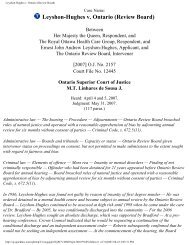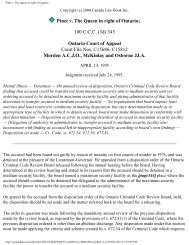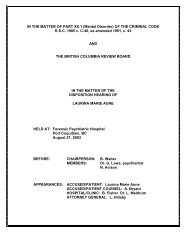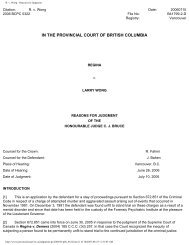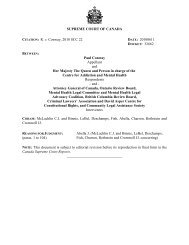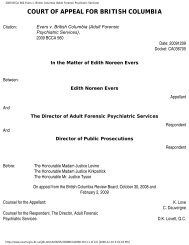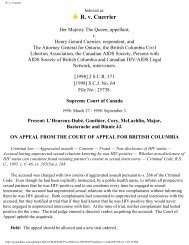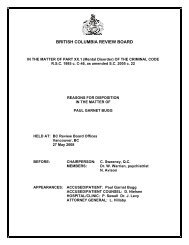LaFortune [LaFortunate] (Re) - British Columbia Review Board
LaFortune [LaFortunate] (Re) - British Columbia Review Board
LaFortune [LaFortunate] (Re) - British Columbia Review Board
You also want an ePaper? Increase the reach of your titles
YUMPU automatically turns print PDFs into web optimized ePapers that Google loves.
<strong>LaFortune</strong> [<strong>LaFortunate</strong>] (<strong>Re</strong>)Indexed as:<strong>LaFortune</strong> [<strong>LaFortunate</strong>] (<strong>Re</strong>)IN THE MATTER OF part XX.1 of the Criminal CodeR.S.C. 1985, c.C.-46, as amended 1991, c.43AND IN THE MATTER of Corinne Cheryl Lafortune[Corinna Cheryl <strong>LaFortunate</strong>][1998] B.C.R.B.D. No. 1<strong>British</strong> <strong>Columbia</strong> <strong>Re</strong>view <strong>Board</strong>E.A. Tollefson, Alternate Chairperson, G. Laws andM. Anderson, MembersMay 6, 1998.(56 paras.)Appearances:Corine Cheryl Lafortune, accused/patient.L. Rupert-Bailey, counsel for the accused/patient.J. Ratel, for the Attorney General.C. Mills, for the Director, Adult Forensic Psychiatric Community Services.1. FactsCHAIRPERSON:--CASE NOTE 1 The Provincial Court of <strong>British</strong> <strong>Columbia</strong> found the accused unfit to stand trial on account ofmental disorder and deferred to the B.C. <strong>Re</strong>view <strong>Board</strong> the responsibility of holding a hearing. Theaccused suffered from a mild mental handicap which placed her as either mildly mentally retarded (I.Q.61) or having "borderline" intelligence (I.Q 72). As well, she had a major behavioral syndrome markedby impulsivity, aggression and destructiveness. The accused was charged with committing assaultcontrary to s. 266 of the Criminal Code.2. Issuehttp://ql.quicklaw.com/qltemp/C2KEwCMAFbZMTYcs/00049bcrb-00000604%2ehtm (1 of 16)2007-08-21 1:59:51 PM
<strong>LaFortune</strong> [<strong>LaFortunate</strong>] (<strong>Re</strong>) 2 This case applies the "capacity" test for determining fitness to stand trial, and considers whatdegree of impairment arising from mental retardation would render an accused unfit.3. <strong>Re</strong>asoning 3 After noting that the accused must fit within the statutory definition set out in the Criminal Codeto be considered unfit to stand trial, the panel applied the "limited cognitive capacity" test. As stated bythis panel, this is a twofold test: (1) is the excused able, after being furnished with an explanation, tounderstand the nature, object and possible consequences of the proceedings, and (2) is the accused able(although perhaps unwilling) to communicate with counsel. The panel noted that this test was set out inR. v. Taylor (1992), 1992 72 C.C.C. (3d) 551 (BCCA), and quoted with approval a statement of thecourt warning against setting too high a standard for determining fitness to stand trial. 4 In this case, the accused had a general idea of the nature and object of the proceedings, such asknowing she could go to jail or be placed on probation. As well, the accused was able to identify theparticipants in a trial (such as the judge and her lawyers), although she was less clear on their functions.This understanding was sufficient to meet the fitness standard. 5 Furthermore, even if the accused did not currently have the necessary knowledge, the panelbelieved that if properly coached, the accused would be able to understand the functions of the court.The panel came to this conclusion based on the accused's I.Q., and the ability of the accused to answersome of the questions of the panel. The panel noted that as the accused had never been to school, and didnot read much, she may not have had the occasion to learn how the court functions. 6 Turning to the second part of the test, the panel noted that the accused was able to communicatewith counsel. Although communicating with the accused could be frustrating, and the accused wouldsometimes refuse to talk to counsel, the panel noted that counsel does not have to be satisfied with thedegree of communications for the accused to be found fit. The accused was able, after some initialdifficulties, to recall some of the circumstances surrounding each of the offences. Given that this was arelatively straightforward case, with independent witnesses, the panel found that this degree ofrecollection enabled the accused to participate in the proceedings. As well, the inability of the accused torecall enough of the index offences to help her counsel in preparing the defence, although relevant,would not of itself render the accused unfit. Such a finding would mean that otherwise competentindividuals would be found unfit, and would always be subject to the jurisdiction of the <strong>Re</strong>view <strong>Board</strong>.BackgroundREASONS FOR DECISION ON FITNESS TO STAND TRIAL 7 The three alleged offences with which Corinne Cheryl <strong>LaFortune</strong> ("the accused") is charged areall assaults contrary to s. 266 of the Criminal Code, which occurred April 18, 1997 at or near Saanich,and August 31 and September 2, 1997 at or near Victoria. The complainants in the first two cases werehttp://ql.quicklaw.com/qltemp/C2KEwCMAFbZMTYcs/00049bcrb-00000604%2ehtm (2 of 16)2007-08-21 1:59:51 PM
<strong>LaFortune</strong> [<strong>LaFortunate</strong>] (<strong>Re</strong>)her caregivers, and in the September incident the complainant was a security officer for the RoyalJubilee Hospital. 8 On March 26, 1998, the Honourable Judge Filmer of the Provincial Court of <strong>British</strong> <strong>Columbia</strong> atVictoria, found the accused to be unfit to stand trial on account of mental disorder and deferred to the<strong>British</strong> <strong>Columbia</strong> <strong>Re</strong>view <strong>Board</strong> (the "<strong>Re</strong>view <strong>Board</strong>") the responsibility to hold a hearing and make adisposition within 45 days. 9 On May 6, 1998, a panel of the <strong>Re</strong>view <strong>Board</strong>, composed of E.A. Tollefson, Q.C. (AlternateChairperson), Dr. G. Laws (Psychiatrist) and M. Anderson (Social Worker) held a hearing in thepresence of the accused; L. Rupert-Bailey, counsel for the accused; J. Ratel, counsel for the AttorneyGeneral of <strong>British</strong> <strong>Columbia</strong>; and C. Mills, a representative of the Director, Adult Forensic PsychiatricCommunity Services. After hearing and considering all the evidence and submissions, the <strong>Re</strong>view <strong>Board</strong>members were unanimously of the opinion that the accused was fit to stand trial and, pursuant to s.672.48(2) of the Criminal Code, ordered that the accused be returned to court for trial of the issue offitness, and that pending the return of the accused to the court she abide by the terms and conditions ofany applicable court orders.Evidence received and considered by the <strong>Re</strong>view <strong>Board</strong> at the fitness hearing 10 No evidence of recent psychiatric assessments of the accused's fitness to stand trial wasavailable to the <strong>Re</strong>view <strong>Board</strong>, but given the static nature of her mental condition, the <strong>Board</strong> took intoconsideration reports of three psychiatric assessments conducted since August, 1996, and a report ofpsychological testing conducted in October, 1997. These reports provide invaluable backgroundinformation about Ms. <strong>LaFortune</strong>'s mental condition.Dr. Lohrasbe's Assessment 11 In a letter of August 29, 1996 (exhibit 1) to the Presiding Judge of the Provincial Court of<strong>British</strong> <strong>Columbia</strong> in Victoria, Dr. S. Lohrasbe, Psychiatrist, Adult Forensic Psychiatric CommunityServices, Victoria, inter alia set out his assessment of Ms. <strong>LaFortune</strong>'s fitness to stand trial. He said thatas an infant she apparently was accidentally poisoned when she ate mushrooms, and this led to delays inher development, seizures and a mild mental handicap. There was also "a major behavioral syndromemarked by impulsivity, aggression and destructiveness." She has never lived alone, always being in thecare of an institution or individual. Dr. Lohrasbe said that she "has never been viewed as psychotic andher ability to comprehend objective reality has never been viewed as impaired." 12 <strong>Re</strong>porting on his interview with her, Dr. Lohrasbe said:http://ql.quicklaw.com/qltemp/C2KEwCMAFbZMTYcs/00049bcrb-00000604%2ehtm (3 of 16)2007-08-21 1:59:51 PM
<strong>LaFortune</strong> [<strong>LaFortunate</strong>] (<strong>Re</strong>)Ms. <strong>LaFortune</strong> did not recall me from our interview four years ago. She was initiallynervous but quite pleasant. She was cooperative, and attempted to answer all questionsplaced to her. She was fully oriented as to time, place, person and situation. Her use ofvocabulary and abstract concepts was limited and in keeping with her testedintelligence which has consistently been within the range of mild mental retardation.Similarly, her level of general knowledge is limited.Ms. <strong>LaFortune</strong> understood the basics of the legal process. She understood what she wascharged with and she understood potential consequences for her. She recalled theincident that led to the charges against her and her account contained no unusual orbizarre features. Ms. <strong>LaFortune</strong> freely admits that she gets frustrated easily and thenstrikes out, usually at objects and sometimes at people.OPINION1. Psychiatric Diagnosis: The only relevant psychiatric diagnosis is mild mentalretardation. In addition, she carries the diagnosis of epilepsy.2. Fitness for Trial: Although her level of comprehension is limited by herintelligence, she is in my opinion fit for trial. 13 Dr. Lohrasbe said that her prognosis would appear to be poor. Despite having been cared for bynumerous sympathetic individuals and institutions, she had not shown any apparent improvement in hertendency to lash out when her demands were not met. He added:She can be irritable, impulsive and aggressive and has a very low frustration tolerance.Unfortunately, what this means is that recurrent bouts of destructive behaviour can beexpected on an indefinite basis. There is no reasonable expectation that psychiatrictreatment is going to significantly after the prognosis.Dr. Miller's Assessments 14 Dr. R.E.W. Miller, Psychiatrist, Adult Forensic Psychiatric Community Services, Victoria,received two court orders for assessment of Ms. <strong>LaFortune</strong>'s mental condition, including fitness to standtrial, the first with respect to the assaults that allegedly occurred August 31 and September 2, 1997 inVictoria, and the second with respect to the alleged Saanich assault of April 18, 1997. 15 In a letter dated September 19, 1997 (exhibit 11) to the Presiding Judge of the Provincial Courtof <strong>British</strong> <strong>Columbia</strong> in Victoria, Dr. Miller dealt with the Victoria assaults. He reviewed previous reportsand assessments of Ms. <strong>LaFortune</strong>'s mental condition, noting that she had apparently scored 61 on an IQtest, which put her in the "Mild Mental <strong>Re</strong>tardation" category. He quoted Dr. Nathan Ory, Psychologist,as commenting that Ms. <strong>LaFortune</strong>'s strengths lie in "her ability to retain repetitively practiced routines"and "to copy from a direct visual model", with her relatively weakest area of functioning being "her poorability to attend or to retain verbal information". 16 From direct examination of Ms. <strong>LaFortune</strong> Dr. Miller reported that she was, after some cuing,http://ql.quicklaw.com/qltemp/C2KEwCMAFbZMTYcs/00049bcrb-00000604%2ehtm (4 of 16)2007-08-21 1:59:51 PM
<strong>LaFortune</strong> [<strong>LaFortunate</strong>] (<strong>Re</strong>)episode likely took place in the living room, although she did not remember what time of day it was, orwhat caused it. She said that when she gets angry, she hits people, usually in the face and with her righthand. She told Dr. Miller that she was not sorry for what happened, for the caregiver deserved to be hit. 21 She knew that she would be returning to court on September 22. She said that she would see herlawyer there and, after some prompting, said she would also see the judge. Dr. Miller reported that inthis interview she had more difficulty in giving an explanation of how the court would proceed, but shedid say that if would be "bad" if she were found guilty, and if this happened "the people would talkabout sending me back here (police cells)." 22 Dr. Miller noted that Ms. <strong>LaFortune</strong> had the ability to read and spell some quite large words,such as "Establishment" and "<strong>Re</strong>cipient" and give correct answers to fairly difficult multiplicationproblems such as 17 x 17 = 289, and expressed the opinion that this was good for a person with an I.Q.of 61. 23 Dr. Miller concluded that Ms. <strong>LaFortune</strong> should be regarded as mentally disordered within themeaning of the Criminal Code. On the issue of fitness to stand trial he wrote:I have significant doubt that Ms. Lafortune is fit to stand trial on this account when onetakes into account the vagueness of her memory and her limited ability to instructcounsel and follow the meaning of proceedings. There is very limited psychologicalassessment on this file and it may well be worthwhile remanding Ms. Lafortune for anassessment by a qualified neuropsychologist [sic].Psychological Assessment 24 In a letter of November 4, 1997 (exhibit 15) to Léandre Rupert-Bailey, Dr. Robert Haymond,<strong>Re</strong>gistered Psychologist, wrote that in October, 1997 he had carried out two standard psychological testson Ms. <strong>LaFortune</strong>. [It does not appear that this assessment is the one that Dr. Miller had suggested bedone (see exhibit 12).] 25 On the Wechsler Adult Intelligence Scale - <strong>Re</strong>vised (WAIS-R) she achieved a score of 72,placing her in the borderline range of intelligence and the 3rd percentile compared to other adults in herage group. However, Dr. Haymond noted that on two subtests which measure competency in, andunderstanding of, the social world, her scores were both quite low. He said that "In terms ofcomprehending how and why the social world functions as it does, her understanding is very concreteand her ability to generalize from one situation to another extremely limited." 26 On the Wechsler Memory Scale - <strong>Re</strong>vised (WMS-R), she achieved a score of 64 in GeneralMemory, placing her in the 1st percentile compared to the sample population in her age range. Verbaland visual memory scores were balanced. Dr. Haymond noted her memory was far better, relativelyspeaking, for simple tasks as opposed to complex ones, and that in the Logical Memory section of thehttp://ql.quicklaw.com/qltemp/C2KEwCMAFbZMTYcs/00049bcrb-00000604%2ehtm (6 of 16)2007-08-21 1:59:51 PM
<strong>LaFortune</strong> [<strong>LaFortunate</strong>] (<strong>Re</strong>)test she showed not only a poor memory but she also confabulated, adding obviously incorrect details. 27 Her IQ score of 72 (as compared with a previous assessment of 61) is perhaps in partattributable to the tests being conducted under what Dr. Haymond termed "ideal conditions". It wouldplace her in the "borderline' range of intelligence rather than that of "Mild mental retardation". However,Dr. Haymond expressed the opinion that during episodes of irritable behaviour her focus could becomevery narrow and she would be "quite unable to deal with situations in a rational manner. In suchsituations her emotional state would tend to limit her memory and cognitive competence considerably."His conclusion on fitness was:With regard to fitness to stand trial, the results of memory testing suggest she wouldpossess great difficulty when attempting to recall events which occurred months oreven weeks ago, especially if these events were of a complex nature and Ms. <strong>LaFortune</strong>were required to differentiate between the dynamic circumstances of two or moreoffences. In short, given Ms. <strong>LaFortune</strong>'s cognitive deficiencies, comprehension oflegal matters is apt to be an overwhelming challenge. 28 It is to be noted that Dr. Haymond apparently did not take into consideration Ms. <strong>LaFortune</strong>'sextraordinary mathematical ability.Examination of Ms. <strong>LaFortune</strong> 29 <strong>Re</strong>view <strong>Board</strong> member, Dr. G. Laws, Forensic Psychiatrist, conducted the principal examinationof Ms. <strong>LaFortune</strong> by the Panel. The following is a summary of the examination as recorded by theAlternate Chairperson. 30 During the hearing, Ms. <strong>LaFortune</strong> had been writing in a very neat script, and Dr. Laws askedwhat she was writing. She replied that it was a note about the place that she was staying. When askedabout her reading ability, she said that she could read regular things but needed large print. Shedemonstrated by reading the title on a newspaper that was on the table -- the Business Examiner,however, when asked what the word "Examiner" meant, she said that she did not know, and when askedif she knew what "Exam" meant, she said that she did not know what that meant either. 31 Dr. Laws then said that we had been told that she was good at mathematics, and wonderedwhether she could tell us what 16 times 16 equalled. Ms. <strong>LaFortune</strong> thought for three or four secondsand replied "256", which is the right answer. When asked whether she had learned how to solvemathematics problems in school, she said "no", adding that she had always been in special classes. Shethen described how the problem could be broken down into either 8s or 4s. 32 Dr. Laws then asked a series of questions to determine the accused's knowledge of the charges,the role of different persons in the court, and procedure before the court:http://ql.quicklaw.com/qltemp/C2KEwCMAFbZMTYcs/00049bcrb-00000604%2ehtm (7 of 16)2007-08-21 1:59:51 PM
<strong>LaFortune</strong> [<strong>LaFortunate</strong>] (<strong>Re</strong>)Q. Do you know why we are here this morning? A. No.Q. Do you know that you have been charged? A. No. I haven't done anythingwrong.Q. Do you know that the court found you unfit to stand trial? A. I don't remember.Q. Do you care what happens in court? A. Depends what it is. [She then went into adiscourse that she did not want to go back to the Forensic Psychiatric Institute,where "dummy" Dr. MacDonald had not given her enough medication, and shehad suffered seizures. She asserted that it was not possible for her to be sentback there, and even when Dr. Laws suggested to her that (even thoughunlikely) it could happen, she reiterated that it was not possible, for her lawyerhad said so.]Q. You have been in court before, do you remember? A. No, I can't remember.They talked about things that happened a long time ago.Q. You have a good memory. They say you hit Cheryl. A. That was a long timeago. Last year. I haven't done anything since last Fall.Q. Do you remember the things you did to people at the Eric Martin Pavilion? A.Those people who make people leave. [She further identified them by sayingthat they had "uniforms"].Q. Do you remember being in a car with people? A. Julie wanted me to get out ofthe car, but I wouldn't.Q. You hit the guy? A. Yes.Q. Were you charged with assault? A. That was last year. I have never doneanything like that since I last did it.Q. That would be called "Assault". What might the court do if you were foundguilty? What happened the last time?A. Go to that place. [Someone beside her said that she was referring to jail.]Q. Might they put you in jail? Do you know what a jail is for? A. They put peoplein jail when they have done something wrong.Q. Have you heard of "Probation"? A. Yes.Q. Have you ever been on probation? A. Yes.Q. What did you have to do on probation? A. See the Probation Officer . . . tocheck up on things.Q. Who makes the decision about whether you are guilty?A. The dummies.http://ql.quicklaw.com/qltemp/C2KEwCMAFbZMTYcs/00049bcrb-00000604%2ehtm (8 of 16)2007-08-21 1:59:51 PM
<strong>LaFortune</strong> [<strong>LaFortunate</strong>] (<strong>Re</strong>)Q. Would you call him that in court? [in a stage whisper, Gail Mody, her currentcaregiver, said "Yes". In reply, Ms. <strong>LaFortune</strong> said to Gail, "You're alwaysinterrupting".]Q. Would you be able to tell if people said something that was wrong? A. Yes.Q. Who would you tell? A. The police.Q. Would the judge believe you? A. Don't know, but Cheryl [her former caregiver]would tell them that I don't do that sort of thing. 33 In reply to questions about the persons in the courtroom, and what their roles are, she said thatthe judge runs the show and wears "a different suit". She had always had a male judge. Her lawyer talksabout things that happen. She referred to another lady in the court, but she did not know whether thisother lady was also a lawyer -- she only described her as being "on the other side", leaving it unclearwhether this meant the other side of the case, or the other side of the courtroom. When asked if she knewwhat the Prosecutor, or Crown Counsel, did, she at first said that she did not know, but then added"Someone who says this is what the person did". 34 Mr. Ratel asked a series of questions:Q. We have never met. Do you know what I do? A. No.Q. Do you know what Léander does? A. Yes.Q. I act for the Crown Prosecutor. Do you know the police are involved? A. Yes. Iknow what you do. You talk about things that happened.Q. I tell the judge what the police say happened. A. It takes a long time to getthrough court. Forever.Q. Do you know what the judge does at the end of the day?A. No. 35 Ms. <strong>LaFortune</strong> was then questioned by Ms. Rupert-Bailey:Q. Do you know what "Likely" or "Unlikely" means? A. I don't know.Q. Have you ever had a trial? A. Don't know.Q. What is a "Trial"? A. I don't know what it is.Q. Do you remember what happened in court? A. They talk about things thathappened.http://ql.quicklaw.com/qltemp/C2KEwCMAFbZMTYcs/00049bcrb-00000604%2ehtm (9 of 16)2007-08-21 1:59:51 PM
<strong>LaFortune</strong> [<strong>LaFortunate</strong>] (<strong>Re</strong>)Q. Who? A. You, someone else, the Judge. [She went on to say that she remembersbeing released.]Q. What does "I represent you" or "I protect your interests" mean? A. I don't know.Q. What do I do for you? A. Say I'm never going back to dummy Forensic. Writeto dummy MacDonald about what they did to me at F.P.I.Q. What do you mean by "going to check with Probation"?A. Go to see Les every second week, then every month.Q. What does "check up" mean? A. He checked up . . . talked to me and Cheryl.Asked how everything was going. Cheryl and I said everything was OK. [Sheadded that they had gone to see him for a year.]Q. What does an "Undertaking" mean? A. I don't know. [At this point the AlternateChairperson intervened to ask whether Ms. <strong>LaFortune</strong> knew what a "Promise"was, and she replied that she did.]Q. Have you ever been in front of any female judge? A. No, always male. 36 Ms. Rupert-Bailey then asked Cheryl Gilding, Ms. <strong>LaFortune</strong>'s former caregiver, to comment onher capability. Ms. Gilding said that when Ms. <strong>LaFortune</strong> does not understand, she just agrees. Shenever reads a book -- she can read but does not understand. Her attention span is poor. She called thejudge a "dummy". She won't talk to Ms. Rupert-Bailey sometimes. She is not able to remember details,but only the high points. She does not understand concepts like "Consequences". 37 During this part of the hearing, the Alternate Chairperson asked Ms. Rupert-Bailey whether shehad given her client any instruction with regard to what the court proceedings were all about, given thatpeople are not born with this knowledge. Ms. Rupert-Bailey replied that she did not "give instructionto", but rather "took instruction from" her client. She was further asked whether she had given Dr.Haymond any guidance with respect to the fitness test as set out by the Ontario Court of Appeal in R. v.Taylor (cited below), and she replied that she had not.Submissions with respect to fitness to stand trial 38 Ms. Mills said that the Director of Adult Forensic Psychiatric Community Services took noposition on this issue, but left it to the <strong>Re</strong>view <strong>Board</strong>. 39 Mr. Ratel said that the Attorney General had concerns about whether she was fit. While she hada rudimentary understanding of the process, and a clear understanding of what she wants, she does notcomprehend that consequences may be different. 40 Ms. Rupert-Bailey submitted that her client did not meet the Taylor test. Although she doesunderstand "arrest", she does not understand that if you break a window you get punished. Her onlyconcern is "Where do I want to be?" Jail as a punishment is not realistic to her. Nobody would call thejudge a "dummy", yet she did. She has no idea about the expected decorum in a courtroom. She has ahttp://ql.quicklaw.com/qltemp/C2KEwCMAFbZMTYcs/00049bcrb-00000604%2ehtm (10 of 16)2007-08-21 1:59:51 PM
<strong>LaFortune</strong> [<strong>LaFortunate</strong>] (<strong>Re</strong>)rigid, compartmentalized way of viewing the world. She does not understand "the nature or object of theproceedings", or the consequences that flow from her actions. She has always pled guilty in the past andhas never had a trial. She communicates well on things that interest her, but she has difficulty talkingabout issues that disturb her.Considerations and Conclusions regarding the issue of fitness to stand trialThe Applicable Law 41 The question of whether the accused is fit or unfit to stand trial is to be determined on the basisof the factors set out in the definition of "unfitness to stand trial", which was introduced into s. 2 of theCriminal Code by the 1991 Mental Disorder Amendments. It provides as follows:"unfit to stand trial" means unable on account of mental disorder to conduct a defenceat any stage of the proceedings before a verdict is rendered or to instruct counsel to doso, and, in particular, unable on account of mental disorder to(a)(b)(c)understand the nature or object of the proceedings,understand the possible consequences of the proceedings, orcommunicate with counsel. 42 By using the term "means", the definition limits the categories of situations in which the accusedmay be found "unfit to stand trial" to those listed therein. In all other cases the accused must be found fitto stand trial. Thus, for example, a person who understands the function of the court, the possibleconsequences of conviction and can communicate with counsel will not be found unfit to stand trialmerely because he/she gives voice to paranoid beliefs impugning the integrity of the court, or displaysrude behaviour toward the court. If it feels it to be necessary, the court can deal with such eventualitiesthrough exercising its contempt power. 43 The definition creates a "capacity" test. The accused is to be found fit to stand trial only if he/she, on account of mental disorder, is "unable" to conduct a defence or to instruct counsel to do so, andin particular is "unable" to understand the nature, object or possible consequences of the proceedings(paragraphs (a) and (b)), or to communicate with counsel (paragraph (c)). A finding of unfitness to standtrial cannot be made simply on the basis that the accused does not give good answers to the traditionalCivics test regarding his/her knowledge of the personnel and procedure in criminal courts and the typeof sentences that may be imposed: inadequate responses may only indicate that the accused has neverhad occasion to learn about the criminal courts. The inquiry that must be made by the court or reviewboard is not whether the accused has present knowledge of these matters, but whether he/she is able orunable to understand them if furnished with an explanation of what they involve. In this regard, the<strong>Re</strong>view <strong>Board</strong> believes that it is entirely appropriate for, if not incumbent upon, counsel to instruct his/her client about these matters before the proceedings. Precedent for such action may be found in thepractice of instructing a witness with regard to the nature of an oath, under s. 16 of the Canada EvidenceAct, where a witness is under the age of fourteen or is a person whose mental capacity is challenged: seehttp://ql.quicklaw.com/qltemp/C2KEwCMAFbZMTYcs/00049bcrb-00000604%2ehtm (11 of 16)2007-08-21 1:59:51 PM
<strong>LaFortune</strong> [<strong>LaFortunate</strong>] (<strong>Re</strong>)the decision of Dickson J.A., for the majority of the Manitoba Court of Appeal, in R. v. Bannerman(1966), 55 W.W.R. 257, affirmed by the Supreme Court of Canada for the reasons given by the majorityof the Court of Appeal, 55 C.R. 76. 44 Similarly, it is only when the court or review board is satisfied that the accused, on account ofmental disorder, is "unable" to communicate with defence counsel that a finding of unfitness to standtrial may be made under paragraph (c) of the definition. Putting this statement of law into a positiveform, if the accused has sufficient mental capacity "to be able" to communicate about the case in ameaningful way with counsel, the accused is "fit to stand trial". On this point the leading decision is R.v. Taylor (1992), 72 C.C.C. (3d) 551. In that case, the accused was charged with aggravated assault andpossession of a weapon dangerous to the public. He had been found unfit to practise law on account ofchronic mental illness, namely paranoid schizophrenia, and had been suspended by the Law Society.There was psychiatric evidence that his paranoia caused him to believe that lawyers and judges were in aconspiracy against him. At the fitness hearing, he repudiated the lawyer appointed by the court, andrefused to cooperate with him, saying that he was an incompetent fraud. Contrary to the advice ofcounsel, he testified at the fitness hearing and stated that he was concerned about the fairness of theupcoming trial. The trial judge found that although he knew the nature of the process and couldcommunicate with counsel, he was unfit to stand trial because his mental disorder was so pervasive thathe was "unable to perceive his own best interests and how those interests should be addressed in theconduct of the trial." The accused appealed but refused to accept counsel, so the court appointed anamicus curiae. In its decision the Court of Appeal accepted the argument of the amicus curiae that thetrial judge had applied too high a standard of fitness, and that the appropriate test is whether the accusedhas "a limited cognitive capacity". At p. 564, the Court said that under this test as propounded by theamicus curiae, a court's assessment of an accused's ability to conduct a defence and to communicate withand instruct counselis limited to an inquiry into whether an accused can recount to his/her counsel thenecessary facts relating to the offence in such a way that counsel can then properlypresent a defence. It is not relevant to the fitness determination to consider whether theaccused and counsel have an amicable and trusting relationship, whether the accusedhas been cooperating with counsel, or whether the accused ultimately makes decisionsthat are in his/her best interests. 45 At pp. 566-67, the Court further elaborated on the limited cognitive capacity test, saying thatone must remain cognizant of the rational for the fitness rules in the firs place:http://ql.quicklaw.com/qltemp/C2KEwCMAFbZMTYcs/00049bcrb-00000604%2ehtm (12 of 16)2007-08-21 1:59:51 PM
<strong>LaFortune</strong> [<strong>LaFortunate</strong>] (<strong>Re</strong>)In order to ensure that the process of determining guilt is as accurate as possible, thatthe accused can participate in the proceedings or assist counsel in his/her defence, thatthe dignity of the trial process is maintained, and that, if necessary, the determination ofa fit sentence is made possible, the accused must have sufficient mental fitness toparticipate in the proceedings in a meaningful way. At the same time, one mustconsider that principles of fundamental justice require that a trial come to a finaldetermination without undue delay. The adoption of too high a threshold for fitness willresult in an increased number of cases in which the accused will be found unfit to standtrial even though the accused is capable of understanding the process and anxious for itto come to completion. 46 The "limited cognitive capacity" test as set out in R. v. Taylor was specifically approved by theSupreme Court of Canada in R. v. Whittle (1994), 32 C.R. (4th) 1, at pp.15-16. 47 In light of the above, is Ms. <strong>LaFortune</strong> unable, on account of mental disorder, to understand thenature, object and potential consequences of a criminal trial? The <strong>Re</strong>view <strong>Board</strong> found that she coldidentify the principal actors at the court: the judge (the man in a different suit), her lawyer, and anotherwoman (at the court fitness hearing, the Crown Counsel was a woman). She was not quite so clear as totheir respective functions, but she did know that the judge "runs the show" and her lawyer talked aboutthings. She also knew the principal risks a trial might have for her -- jail (which she at first referred tosimply as "that place") or probation, and as far as the latter was concerned her replies to her owncounsel's questions revealed a reasonable knowledge of what was involved in reporting to a probationofficer. She also appeared to associate being sent to the Forensic Psychiatric Institute (which shereferred to as "dummy Forensic") as a consequence of court proceedings, although she was adamant thatshe would not be sent there this time. While some of her answers to her counsel were of the "I don'tknow" variety, generally these answers related to questions asking for the meaning of legal terms, suchas "trial", "I represent you" and "undertaking". Ms. Rupert-Bailey did not attempt to simplify thequestions by using less technical terms, such as "promise", which her client did understand. It is perhapsnot surprising that Ms. <strong>LaFortune</strong> does not know the meaning of these words inasmuch as she has notattended the regular school system, does not read much, and apparently has never been at an actual trialor had the nature of the trial process explained to her. The <strong>Re</strong>view <strong>Board</strong> is satisfied that Ms. <strong>LaFortune</strong>meets the "limited cognitive capacity" test in that she has a general idea of the nature and object of theproceedings, and of the consequences of being found guilty. Moreover, in the light of her IQ of 72 andher responses to Dr. Laws' questions, the <strong>Re</strong>view <strong>Board</strong> is of the opinion that, Ms. <strong>LaFortune</strong> has thecapacity to increase her understanding of these matters if properly coached. 48 The second inquiry that must be made is about the capacity of accused to communicate with hercounsel as required by paragraph (c) of the definition of "unfitness to stand trial". Ms. Rupert-Bailey toldthe hearing that she found questioning her client to be a very frustrating experience, and Ms. Gildinggave evidence that Ms. <strong>LaFortune</strong> sometimes would not speak to her lawyer. Once again, we mustremind ourselves that the issue is not how satisfied counsel is with the degree of communication that hasexisted heretofore with her client, but whether her client is "unable on account of mental disorder tocommunicate with counsel."http://ql.quicklaw.com/qltemp/C2KEwCMAFbZMTYcs/00049bcrb-00000604%2ehtm (13 of 16)2007-08-21 1:59:51 PM
<strong>LaFortune</strong> [<strong>LaFortunate</strong>] (<strong>Re</strong>) 49 The <strong>Re</strong>view <strong>Board</strong> finds as a fact that although occasional frustrations may exist in therelationship between Ms. Rupert-Bailey and her client, their relationship is much more congenial thanthat in R. v. Taylor; yet the Court of Appeal found that Taylor was mentally capable of communicatingwith counsel. 50 Does Ms. <strong>LaFortune</strong>'s memory render her "unable on account of mental disorder tocommunicate with counsel?" Dr. R. Miller thought that she was fit to stand trial with respect to the lattertwo offences (which had occurred only a few weeks before he wrote his letter of September 19, 1997(exhibit 11)), but in his letter of September 22, 1997 he expressed doubt as to her fitness to stand trialwith respect to the April offence because of "the vagueness of her memory and her limited ability toinstruct counsel and follow the meaning of proceedings" (exhibit 12). Dr. Haymond, in his report ofNovember 4, 1997 (exhibit 15), opined that she would find great difficulty in remembering events thathappened many months ago, particularly if they were of a complex nature. 51 The <strong>Re</strong>view <strong>Board</strong> is satisfied that on the day of the hearing Ms. <strong>LaFortune</strong> met therequirements of the Limited Cognitive Capacity test. Her first answers to Dr. Laws were that she did notknow or could not remember, but as the conversation between them went on, with questions being askedin different ways, she revealed more and more about the circumstances surrounding the three allegedoffences. Even though she did not appear to know the name of the offence she was charged with in eachof the three cases (Assault), she knew it was for hitting people. She knew that one of the cases involvedan attack a year ago on her caregiver, Cheryl; a second case involved her hitting somebody when "Julie"wanted her to get out of a car; and the third occasion involved people in uniform ("those people thatmake you leave") at Eric Martin Pavilion. The fact that she was able to provide this information with alittle encouragement and prompting tends to indicate that the initial denial of any recollection hadnothing to do with her cognitive capacity but rather her volition -- like many witnesses she prefers not torecount certain things that she has done in the past. However, willful failure to answer such questions isnot within the definition of "unfitness to stand trial", for the failure is caused neither by an incapacity tocommunicate, nor by mental disorder. The <strong>Re</strong>view <strong>Board</strong>, of course, does not know whether theresponses given were either truthful or accurate, but they were coherent and rational, and seemed to beconsistent with her responses to Dr. Miller in September, 1997 (exhibits 11 and 12) and were notinconsistent with information contained in the police occurrence reports to Crown Counsel. 52 Dr. Haymond expressed the opinion that she would have particular difficulty in remembering"complex" events that happened many months ago". Certainly, in determining whether the accused isable "to participate in the proceedings in a meaningful way" (to quote the words used by the Court in R.v. Taylor), the <strong>Re</strong>view <strong>Board</strong> has to take into account the complexity of the case, and the other sourcesof information available to the defence counsel. In the three index offences, the facts appear to berelatively simple, and in each of the latter two cases there was an independent witness. 53 Even if it were concluded that Ms. <strong>LaFortune</strong>'s memory is vague to the point of rendering herunhelpful to her counsel in the preparation of a defence, the law appears that this by itself would not be ahttp://ql.quicklaw.com/qltemp/C2KEwCMAFbZMTYcs/00049bcrb-00000604%2ehtm (14 of 16)2007-08-21 1:59:51 PM
<strong>LaFortune</strong> [<strong>LaFortunate</strong>] (<strong>Re</strong>)sufficient reason for finding her unfit to stand trial. As a result of some cause other than a mentaldisorder, many people have no memory of what transpired in a particular time frame, but this lack ofmemory does not preclude the holding of a trial. In R. v. Boylen (1972), 18 C.R.N.S. 273 (N.S.Magistrates Court), the accused claimed that a prosecution should not proceed because, due to aconcussion he had lost his memory, and he therefore could not make full answer and defence, and as aresult would be denied the right to a fair hearing guaranteed under s. 2(c) of the Canadian Bill of Rights.Magistrate Kimball rejected the claim, saying (at p. 278):The inability of an accused, who is otherwise normal, to recall events and to not be ableto instruct counsel as is normally done, in my opinion, does not deny him the right to afair hearing. It does not deny him the opportunity to exercise his right to examine andcross-examine witnesses or testify himself if he wishes to do so. If it were otherwiseloss of memory could become a very easy refuge for those persons who were otherwisefully responsible for the consequences of their acts. The fact that a person does notremember certain events does not mean he was not fully responsible for those eventswhen they occurred and, in the absence of the defence of insanity, in my opinion, heshould not be excused from that responsibility. 54 Even though R. v. Boylen was not a mental disorder case, there are good reasons for followingit in cases such as the present. If the rule were that "unfitness to stand trial" was established upon proofof the accused having no memory of the alleged crime or its surrounding circumstances on account ofmental disorder, it would mean that mentally disordered accused persons would have to be found unfit tostand trial even though in every other respect they were capable and anxious to proceed. This is anexample of what the Court of Appeal in R. v. Taylor meant when it warned about the danger of settingthe threshold of fitness too high (see supra). Moreover, where, as in Ms. <strong>LaFortune</strong>'s case, theprofessional evidence is that memory will only worsen with the passage of time, the finding of unfitnesswould almost certainly continue to apply; and, barring a stay of proceedings or a finding that the Crownno longer had a prima facie case, the accused would be subject to an order of the <strong>Re</strong>view <strong>Board</strong> for therest of his/her life, even if he/she was not a significant threat to the safety of the public and did notrequire psychiatric supervision. This would amount to imposing a life sentence of probation without thebenefit of trial. 55 The conclusion reached by the <strong>Re</strong>view <strong>Board</strong> is that although a lack of memory relevant to thealleged crime may be considered in determining whether an accused is unable on account of mentaldisorder to instruct counsel, it is not conclusive of the issue. The <strong>Board</strong> is satisfied that Ms. <strong>LaFortune</strong> iscapable of communicating with her counsel and any lack of memory she displays will not prevent hercounsel from presenting a defence. 56 Having found the accused, Corinne Cheryl <strong>LaFortune</strong>, to be fit to stand trial, the <strong>Re</strong>view <strong>Board</strong>therefore orders, pursuant to s. 672.48(2), that she be returned to the court for trial of the issue of fitness.QL Update: 20000911http://ql.quicklaw.com/qltemp/C2KEwCMAFbZMTYcs/00049bcrb-00000604%2ehtm (15 of 16)2007-08-21 1:59:51 PM
<strong>LaFortune</strong> [<strong>LaFortunate</strong>] (<strong>Re</strong>)qp/s/qldrkhttp://ql.quicklaw.com/qltemp/C2KEwCMAFbZMTYcs/00049bcrb-00000604%2ehtm (16 of 16)2007-08-21 1:59:51 PM


![LaFortune [LaFortunate] (Re) - British Columbia Review Board](https://img.yumpu.com/42779845/1/500x640/lafortune-lafortunate-re-british-columbia-review-board.jpg)
